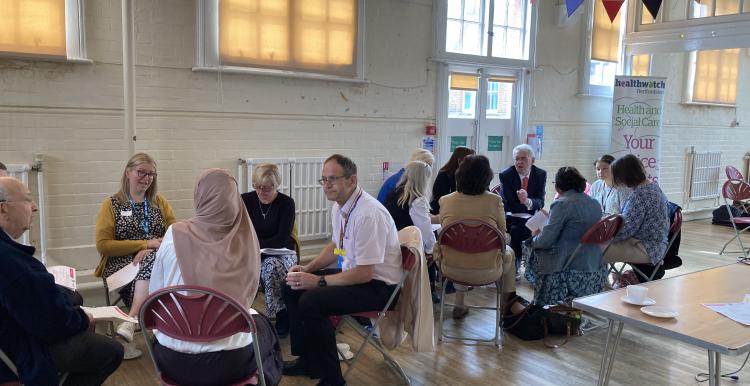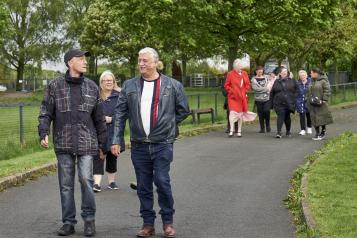By listening to you, local services are making improvements – our Annual Report 2023/24

“Our efforts remain in high demand as pressures on health and care services increase and representing the patient voice remains paramount.
We are regularly commended for our listening and caring approach and we have excellent relationships with Hertfordshire providers and Commissioners. This means that patient experiences are not only heard, but improvements are made – as evidenced here in our latest Annual Report which shows the significant impact we have made locally.”
Geoff Brown, Chief Executive of Healthwatch Hertfordshire
Highlights from our year:
Cost of Living
You said: More than 7000 Hertfordshire residents shared how the rising cost of living was impacting them, their families and their communities.
We raised your concerns with local health and social care services.
They did: Hertfordshire County Council’s Cost of Living Response Group used our data to gather real-time feedback and target support by:
- Directing more than £82,000 to address food insecurity and health inequalities in disadvantaged communities.
- Enabling the Money Advice Unit to allocate more than £700,000 to those hit hardest, through a joint initiative which helped people accessing mental health services (via Hertfordshire Partnership University Foundation Trust) to also get financial support.
Carers
You said: More than 450 carers told us the support received from their GP practice was inadequate and over 30% were not even registered as a carer.
We raised your concerns with the local NHS Primary Care Board.
They did: Reminded each practice that it should have a Carer Champion and proactively identify carers on clinical records, offering them health checks and signposting to social prescribers and help with wellbeing.
Autistic Adults
You said: More than half of the 130 autistic adults we spoke to said they found the process of making a GP appointment highly stressful, while 66% were not aware of the reasonable adjustments they were entitled to.
We raised your concerns with local health and care providers.
They did: Annual GP Autism Health Checks are being trialled at some GPs. Also being considered are:
- ‘Digital flags’ on GP patient records, indicating an autism diagnosis and eligibility for reasonable adjustments.
- Flexibility of appointments and more than one way to book an appointment, plus accessible communication in a range of formats.
- Autism and neurodivergence awareness training for staff.
Cervical Screening
You said: More than 230 women told us their cervical screening was ‘fine’, but they still faced barriers and difficulties.
We raised your concerns with local health providers.
They did: New toolkits for GP practices are being created to support with advice, messaging and awareness of adjustments, to make the experience more comfortable where possible. Schemes to encourage women to attend screening are also being rolled out.
Community Pharmacies
You said: People told us they were generally satisfied with local pharmacies, but they would like more promotion of services and better communication with GPs.
We raised your concerns with local health providers.
They did: Campaigns highlighting community pharmacist skills and the services they offer are being rolled out, while additional staff are improving collaboration between GPs and pharmacies.
Drug & Alcohol Services
You said: Services are very good but access and awareness could be improved, as well as support for loved ones and integration with external organisations.
We passed on this feedback to local public health providers.
They did: Improved access to, and collaboration between, mental health and drug and alcohol services, as well as exploring more opportunities to better support carers and improve local services.
Sexual Health
You said: Adults generally have good access to local sexual health services but more information about infections, prevention and testing, as well as clinics in more discreet locations and additional online services are needed.
We raised your concerns with local public health providers.
They did: Our findings and other local data will be used to better plan and deliver support, including working with various organisations to develop new resources and streamline testing services.
Signposting
You said: Our Signposting service was contacted by a wheelchair user who had been without a fully functioning, safe wheelchair since late 2022 when local wheelchair services changed providers. There had been several failed attempts to replace the chair’s wheels.
We asked local health providers to investigate.
They did: The provider looked into the case and found that poor records suggested the wheels had been replaced, when in fact they had not. Thanks to our prompting, they subsequently carried out the repairs.
Additional highlights from our year:
- 10,136 people shared their experience of health and social care services with us, helping to raise awareness of issues and improve care.
- 53,394 people came to us for clear advice and information about topics such as mental health and the Cost of Living Crisis. This is a near 20% increase on last year.
- We met with health and care leaders on more than 200 occasions throughout the year to highlight issues raised by patients.
- We spent more than 500 hours signposting and represented the concerns of callers to those who provide services.
- We made 110 research-based recommendations on how to improve health and social care in Hertfordshire.
Downloads
To find out more about our work during the year, download a brief summary or the full Annual Report 2023/24 here:


